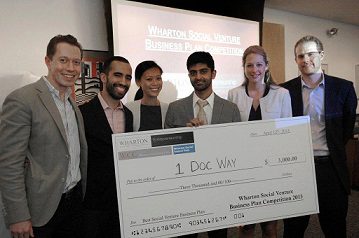
(Photo Credit: Alyssa Cwanger for the Wharton School)
PHILADELPHIA, PA.– The Wharton School’s Social Impact and Private Equity/Venture Capital student clubs announced that the student team 1DocWay won the $3,000 Grand Prize of the inaugural Wharton Social Venture Business Plan Competition (http://whartonpevc.com/activities/wsvbpc/). The prize was awarded at the Social Venture Final Round on April 12, 2013, after finalists delivered pitches before a judging panel of experts in entrepreneurship, venture capital, technology, and social impact.
1DocWay is an online platform that helps hospitals expand psychiatry inpatient and outpatient revenue by connecting to underserved and rural patient populations. Its HIPAA-compliant video chat platform transforms any room with a webcam and internet connection into a doctor’s office helping patients access psychiatrists quickly and easily. Rural, elderly, and other underserved patients can schedule appointments online, building hospitals’ referral base and reducing the high cost of co-morbidity – or incidence of both chronic physical and mental illnesses.
In the past year 1DocWay has implemented over 2,000 doctor-patient sessions. In addition, 1DocWay has received recognition as a Wharton Venture Initiation Program selection, and as a winner of Independence Blue Cross’ IBX Game Changers Challenge and the Wharton Venture Award.
The Wharton Social Venture Business Plan Competition, held for the first time this year, was open to both individuals and teams with high-impact, sustainable business ideas that address a pressing global social issue. The competition aimed to promote social impact at Wharton and the broader Penn community by providing opportunities and resources for budding social entrepreneurs and global change-makers.
The other finalists were:
- Energize the Chain: Using cell phone towers to power refrigeration of vaccines in developing countries.
- Toilets for People: Building private, affordable, sustainable, and safe toilets for the 2.6 billion people suffering from inadequate sanitation in the developing world, particularly in flood-prone areas.
- The Social Loan Company (SoLo): Developing a next generation credit-scoring algorithm to unlock access to finance for the 2.5 billion unbanked people around the world.
- Social Enrichment Partnership Card: Designing a discount card to help economically disadvantaged individuals and families afford a variety of products and services.
- Bridging Communities Fund: Managing a student-led micro-loan program that empowers West Philadelphia entrepreneurs and small business owners.
The judges included Erica Lock from Echoing Green, Suresh Shenoy from IMC Global Services, John Moore from Robin Hood Ventures, Professor Ian MacMillan from Wharton’s Sol C. Snider Entrepreneurial Research Center, and Dr. Peter Frumkin from the Center for High Impact Philanthropy and Professor of Social Policy at the University of Pennsylvania.
The Wharton Social Venture Business Plan Competition was co-sponsored by the Wharton’s Sol C. Snider Entrepreneurial Research Center, Wharton Private Equity/Venture Capital Club, and Wharton Consulting Club. The competition was jointly organized by Jeanne Chen and Sarah Eversman from PE/VC Club and Vasco Bilbao-Bastida and Andrew Karlin from Social Impact Club as a student-led initiative to promote social impact at Wharton and the greater Penn community.
###
Photo: Wharton Social Venture Business Plan Competition_Samir Malik_3rd from right-founder, 1DocWay_event organizers from left_Stephan Muecke-Vasco Bilbao-Bastida-Jeanne Chen-Sarah Eversman-Andrew Karlin
Photo Credit: Alyssa Cwanger for the Wharton School
About the Wharton School
Founded in 1881 as the first collegiate business school, the Wharton School of the University of Pennsylvania is recognized globally for intellectual leadership and ongoing innovation across every major discipline of business education. With a broad global community and one of the most published business school faculties, Wharton creates economic and social value around the world. The School has 5,000 undergraduate, MBA, executive MBA, and doctoral students; more than 9,000 annual participants in executive education programs; and a powerful alumni network of 91,000 graduates.



